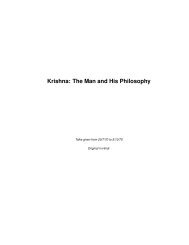Hyakujo: The Everest of Zen, with Basho's Haikus - Oshorajneesh.com
Hyakujo: The Everest of Zen, with Basho's Haikus - Oshorajneesh.com
Hyakujo: The Everest of Zen, with Basho's Haikus - Oshorajneesh.com
You also want an ePaper? Increase the reach of your titles
YUMPU automatically turns print PDFs into web optimized ePapers that Google loves.
CHAPTER 5. DON’T BE IDIOT BUDDHASA <strong>Zen</strong> meditator also reads the scriptures, but his reading cannot be called empty. He brings thosewords back again to life through his meditativeness, through his own wisdom. Someone has spokenthose words out <strong>of</strong> wisdom, out <strong>of</strong> enlightenment – a buddha. Only another buddha can bring themto life again. Only another buddha can give meaning to them again.<strong>Hyakujo</strong> says, ”We are not tumbling into emptiness. Even if we are reading the ancient sutras, theyare always secondary. We are simply testifying to our meditativeness, looking into the mirrors <strong>of</strong> thescriptures. For us, scriptures are a kind <strong>of</strong> reference source. Alone, inside, we don’t know whetherwe are on the right track or not. Reading about the same track in the scripture, functions in a doubleway. It makes the scripture alive, and it makes you confident to move along the same path you aredoing.”Basho wrote a small haiku:YELLOW ROSE PETALSTHUNDER –A WATERFALL.Remember always, a haiku is a painting in words. Silently Basho must have been meditating andwhen he opens his eyes saw ”yellow rose petals, thunder – a waterfall.”Just the minimum words are used. <strong>Haikus</strong> are telegrams – not a single unnecessary word. Youcannot add into this small haiku another word, nor can you take out a single word. It is exactlyin a silent mind that opening the eyes and looking outside: rose petals and a great thunder and awaterfall.Try to understand haikus as paintings in words from great masters <strong>of</strong> meditation. That is the onlyway to understand them. Otherwise they are just empty words, unrelated, <strong>with</strong>out any grammarand no care about the language. <strong>The</strong>y don’t say anything. <strong>The</strong>y simply show something: if youare meditating, and out <strong>of</strong> meditation you open your eyes, whatever you see be<strong>com</strong>es so beautiful,so poetic, so musical that <strong>Zen</strong> masters keep a copybook <strong>with</strong> them. <strong>The</strong>y simply note down a fewwords.Those words actually represent what they have seen. <strong>The</strong>y don’t elaborate, they don’t make a greatpoem out <strong>of</strong> them. <strong>The</strong>se are simply notes <strong>of</strong> meditators about the beauty <strong>of</strong> existence <strong>of</strong> which thenon-meditators are absolutely unaware.Question 1Maneesha’s question:BELOVED OSHO,IT SEEMS THAT IF WE ARE EVEN TO BEGIN THE JOURNEY, WE NEED TO FEEL CONNECTEDTO YOU. IF WE ARE TO persevere WE NEED TO love YOU. BUT ONCE WE HAVE SOMETHINGWE CAN DEFINE AS A RELATIONSHIP WITH YOU, YOU WILL TELL US TO DROP IT.<strong>Hyakujo</strong>: <strong>The</strong> <strong>Everest</strong> <strong>of</strong> <strong>Zen</strong>, <strong>with</strong> Basho’s <strong>Haikus</strong> 83 Osho
















